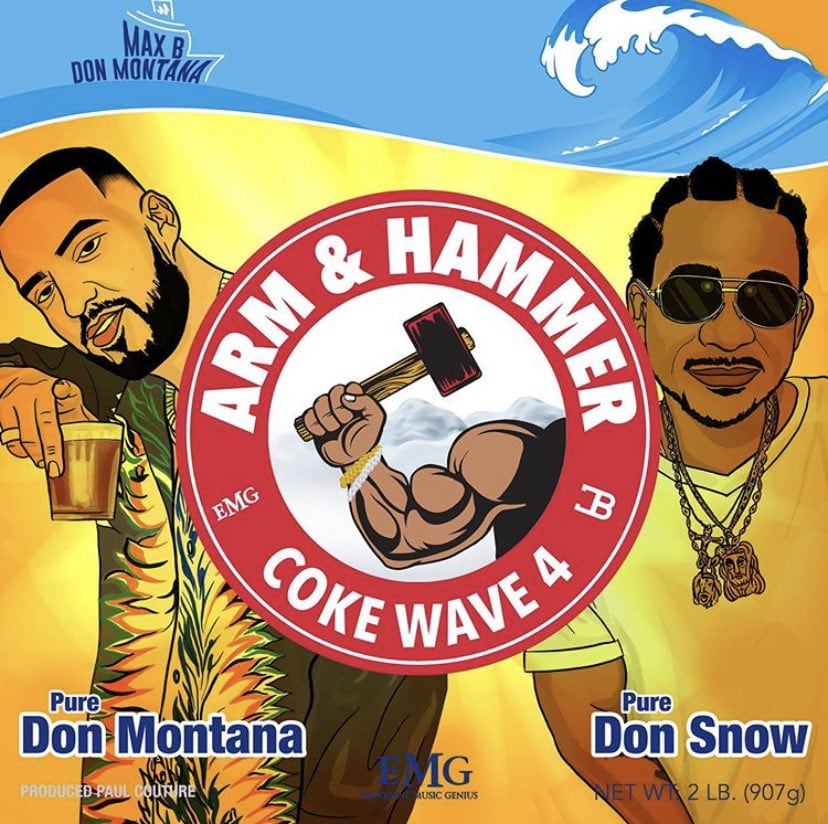
It can be strange to remember that French Montana didn’t spring from a fountain inside The Commons at Calabasas™, fully-formed and ready to feed $40,000 giraffes from a bottle as if he was their extremely well-coiffed father, to Address Claims He Got With Khloe Kardashian Whilst Still Dating Trina and Reunite With Khloe Kardashian at Kourtney’s Birthday After Flirty IG Interaction and Defend Khloe Kardashian Amid Jordyn Woods, Tristan Thompson Cheating Scandal, to rap on Jimmy Kimmel’s stage between Billy Crystal interviews, to kind of morph into Drake a little bit, to gorge himself on no fewer than “three distinct types of prawns” before crashing Sandra Bullock’s 54th birthday party. He bounces from hit to hit alongside famous friend after famous friend like a vaguely sleepy chameleon; it seems, at times, as if it always has been and always will be this way. But before French seemed permanently situated in tropical villas and on the Hot 100, he was part of a strange, specific era of rap music on the opposite coast.
French grew up just outside of Casablanca before, at 13, immigrating to the South Bronx with his family and being drawn to New York hip-hop as if by a slightly mean, Yankee-hatted siren. He hustled DVDs and hung around the fringes of the city’s scene until he linked up with a second-wave Dipset upstart named Max B. When French and Max started recording together, the latter was out on bail; by the time, shortly thereafter, that he went away, seemingly for good, he’d left behind a staggering catalog of music — much of which was partially or totally controlled by a rapper Max was beefing with.
The musical world French and Max built for themselves gestured toward the Dipset of old, where samples could be obvious and in-your-face while the seams of the beats were left showing. But their records were denser, lusher, improbably weirder. The Heatmakerz songs from the beginning of the decade drove Cam, Juelz, Jim et al. directly, punishingly ahead while the Coke Wave tapes were happy to drift and explore, even if that drifting and exploration was underscored by a sense of dread. The first two records in that series were part of a run that cemented Max as one of the most unmissable rap stylists to emerge this century, someone who could knock you off balance by slipping in and out of monotones and pained harmonies as he saw fit, someone who pushed 50 Cent’s rap-sung hybrid to its psychedelic extreme.
Coke Wave 4 –– French recorded his portions in one week of marathon sessions in L.A., working off demos Max had cut from behind bars with the producer Paul Couture –– is striking for how close it skews in sound and chemistry to those records from a decade ago. You would expect that, even if the raps and beats were good, the finished product would seem contrived and unnatural on a base level, like a Netflix revival of a beloved show from the past. But Max’s vocals are perfectly in time, his pen sharp, his indelible flow exactly intact. At nine songs, CW4 (they decided to skip 3, apparently) feels like a preview of something much larger to come, but is, on its own merits, one of the most improbably good rap records of the year.
Even given what we know about the American justice system –– how it makes crushing, life-altering and -ending decisions drowsily, arbitrarily –– Max B’s story seems like it was ripped straight from a Greek myth. He grew up in his ultra-religious grandmother’s home, singing in the Harlem Boys Choir; he learned what he could about secular music, and rap specifically, through the cassette tapes that the older brother Max idolized would leave in his care when he was running “in and out of town.” (When Max was 12 that brother, Eric, was murdered in Baltimore.) Right before he turned 18, Max was sent away for eight years on a robbery conviction. He came home, leveraged some childhood friendships to slip his way into the studio, went on a scorched-earth run with music that made him a star and led to a power struggle with his inner circle, and was locked back up. Now 41 –– and now Inmate 000904278D at a state prison near Trenton –– Max has spent less than a half-decade of his adult life free from prison.
The details of the case that led to his 75-year sentence on murder, armed robbery, and related charges are readily available online. It stems from a 2006 incident in a New Jersey hotel that left one man dead; Max was not in the state at the time of the robbery but was charged and convicted under conspiracy law. (It now seems likely that, thanks in large part to a 2016 plea bargain, Max will be released within the next few years.) Also readily available: the massive trove of music that Max wrote and recorded while he was free, mostly while he was out on bail and fighting this case.
As mentioned, Max’s prison recordings somehow shake off the decade of rust and lag time to tap back into whatever magic well he’d first discovered in the W. Bush years. Earlier this month he released a solo single –– called “Black and I’m Proud,” teased as part of a coming album called Negro Spirituals –– on which he says he’s “Not the best MC, but got the greatest of flows.” He’s right about the flow (silky but engaged, laconic but technical), and he’s underselling the writing. At moments, Coke Wave 4 treats the mundanity of life on the outside as the sort of impossibly lavish living that’s only accessible to Max: On the sneering “Super Bad,” he raps about dipping his toes in a backyard pool and keeping his kids from playing hooky as if it’s one of those luxury safaris from French’s Instagram. This –– the instinct to marry cold, bloody realism with a sensibility that’s both very expensive and slightly alien –– has always made Max’s raps a careening joy to listen to, and, here, he finds it characteristically easy to tap back into that vein. See “Double Trouble,” where he convincingly compares himself to the pope; see “Hold On,” where he uses what could be a spring break anthem to shrug off drug overdoses and the massive suit budget that his court schedule necessitated.
Toward the end of the record, Max and French rap over Grandmaster Flash and the Furious Five’s “The Message.” It is, in Coke Wave tradition, a delightfully strange thing to do. It’s also, in a roundabout way, a reminder that the rap music Max has made, alone and with French, is now a part of New York’s long history –– not a blip during a period of panic, but a rich and rewarding catalog to be combed over for generations to come. And against all odds, it seems like Max B might get a chance to add to it.
